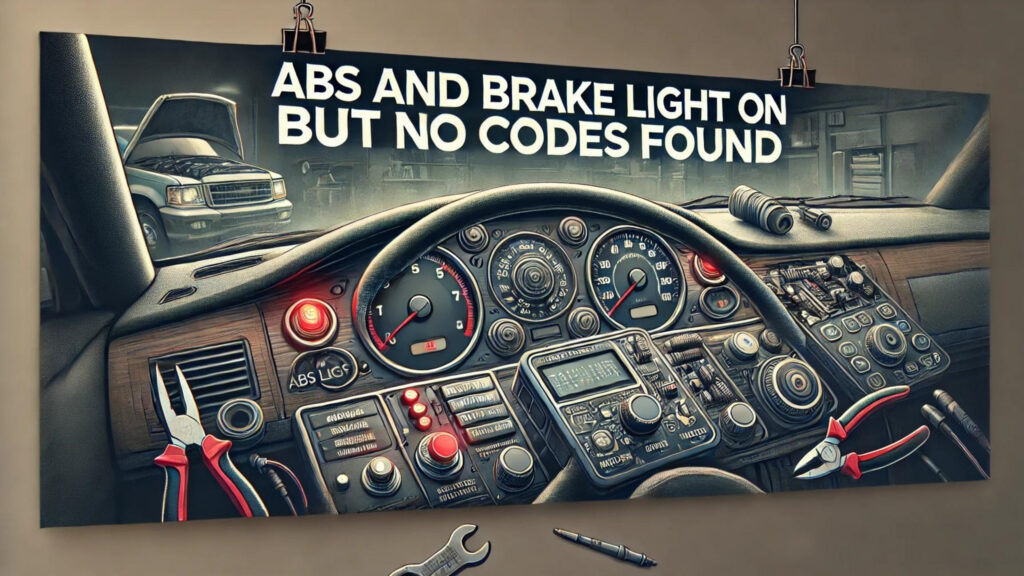if your ABS and brake lights are illuminated but no codes have been identified, that
indicates an issue with your braking system that requires urgent attention. As these
issues could potentially be life threatening, it is imperative that they are taken care
of as soon as possible.
Poor ABS sensor wiring, worn out tires and an improper functioning ABS module are
among the main causes for warning lights to illuminate on a vehicle.
Loose ABS Sensor Wiring
ABS sensors transmit wheel rotation information to a computer via wires connected
with them, but loose or corroded connections could prevent these signals from
getting through, prompting an error light to illuminate and alert of something amiss
in the ABS system.
Wires connecting sensors to an ABS control module may become loose over time,
causing lights to remain illuminated. While less likely, it still could result in
illuminated warning lights remaining illuminated.
Dirt may build up on sensors or connectors, preventing water or physical damage to
them from reaching them. A multimeter can help by probing their wire ends; some
carry millivolts so any resistance can be significant; aerosol contact cleaner can be
used to clear away corrosion before starting this task; your car may require you to
jack it up to access some connections – so always do research prior to commencing.
Worn Out Tires
ABS and brake lights are two warning lights that may illuminate if something goes
amiss with your anti-lock braking system, possibly leaving you less control of
emergency braking or slowing the rate at which your car stops under normal driving
conditions. If these warning lights illuminate, something is wrong with either system
that could reduce your ability to manage emergency stops as well as speed of
stopping during regular driving conditions.
As soon as your ABS or brake lights illuminate, it is wise to bring your car into an
experienced mechanic for diagnosis and possible repairs. They will quickly identify
what the cause may be before providing recommendations and solutions
accordingly.
Over time, the wiring and sensors for an ABS can become damaged due to constant
exposure to moisture and dirt from driving on public roads. Sensor rusting may
interfere with its signal sent back to the computer; this may lead to an ABS light
coming on but no error code being generated by OBD-II reader; otherwise a
technician would need to check your ABS controller to assess what may be going
wrong.

Faulty ABS Module
If the wheel speed sensors, battery voltage and other components in your ABS
system have all been checked, the problem could lie with one or more defective ABS
modules. These microprocessor computers control communication between wheel
speed sensors and hydraulic valves; should one become defective it can trigger both
brake lights and ABS lights to illuminate simultaneously even without an error code
being stored in its memory.
An issue with an ABS module could cause the brake pedal to require additional effort
when engaging and slowing down your vehicle, prompting it to become harder than
usual to engage. Should this be happening to you, having a professional take a look
would likely be in order.
Repairing ABS modules can be accomplished, though this should only be attempted
with professional experience and access to all necessary tools and equipment. These
repairs may prove expensive; for this reason it may be more economical to simply
replace it altogether.
Bad Brake Master Cylinder
Faulty brake master cylinders can prevent your car from activating ABS and other
braking systems, as well as make pedal feel spongy or even drop to floor level.
Your master cylinder provides all of the pressure used by your calipers and ABS
system to create friction against your tires. It contains a reservoir to hold brake
fluid; however, its seals could become worn out over time and leak.
Brake fluid should typically have a light golden hue and clear consistency. If your
brake master cylinder leaks and causes contaminants or metal shavings to enter
into its reservoir, however, that could change and become polluted with
contaminants and metal shavings – signalling it’s likely time for an upgrade or
replacement of its master cylinder.
Your ABS shares many components with your traction control system, so any issues
with either can cause the other to malfunction. If either of your ABS or traction
control lights remain illuminated after using a code reader to disable them, here are
some tips that may help identify what may be going on in your car.